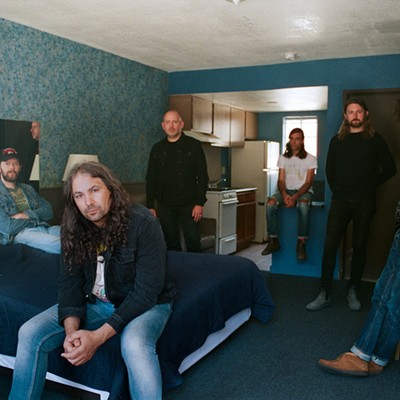Black Canyon with The Dead Armadillos
9 p.m. Friday
VZD’s Restaurant & Club
4200 N. Western
www.vzds.com
524-4203
Southern fun is at the heart of what Jordan Herrera and Jake Morisse are doing with their upstart indie-roots band Black Canyon, and in just a brief time, they’ve made huge strides in bringing that back into the heart of other Oklahomans.
The pair first met in the fitting setting of Enid, immediately bonding over a love of banjos and fiddles, as well as their familiar upbringings.
“Being from small town Oklahoma, this Southern sentiment is sort of embedded in our hearts,” Morisse said. “We grew up with our Taking Back Sundays and New Found Glories, and I loved that stuff when I was a kid, but there was always that Midwestern farm life lodged deeper inside, and it means so much more to me now more than ever.”
With similar aspirations and a will to try something new (old, that is), the two vowed to play together and see what would come of it. It took a little bit of time, but a few jam sessions led to more steady collaboration on top of other projects for each. This one, however, stands atop a steady purpose: resurrecting what music meant 100 years ago.
“We talk about it a lot, the idea of Southern music being lost,” Morisse said. “Back in the day, people would pass around guitars and enjoy each other’s songs and tell stories. It’s not like that any more; it’s very much that’s the band and this is the crowd. That’s not what it was meant to be; it’s supposed to be a dance between both.”
Black Canyon’s mission was ramped up a notch after a message from Morisse to Herrera one day; harkening back to days Southern music glory was soon to become more than an instrumental affair.
“Jake texted me one day and said, ‘Let’s write an album about the Civil War,’” Herrera said. “I was all for it, and that’s what our record has become.”
The skirmish concept is about more than a kitsch factor or artificial Lincoln or Grant name-checks, however; it’s about evoking thoughtful emotions and growing beyond the new norm.
“I came to a point in my songwriting where I was done writing about girls,” Morisse said. “I wanted to have a project to put myself to that was something different, something that didn’t feel so empty, and there was a depth to love and music in that era. From love letters to clutching a photograph on the battlefield, everything was so passionate back then. There was such a beauty and romanticism, and it’s been lost.”
They struck out to restore that in what little way they could, setting up a storyboard in their living room and writing a full narrative of love gained and lost as a man goes to war, never to return.
At first glance, such heady subject matter doesn’t necessarily mesh with the group’s mission of fun, but a closer look reveals something less stiff and serious. Music was something to be truly enjoyed and absorbed back then; it was an escape from the horrors of battle that involved full commitment to the songs being performed right in front of you.
“At the most basic level, this is about having fun,” Morisse said. “That’s what true Southern music is: It’s about getting out of the back corner of the room and come enjoy yourself.”
Herrera and Morisse have found a group of like-minded musicians — including Riley Jantzen of Stillwater favorite Mayola — to record the album (which should come out early next year) and to perform the tunes in concert, although they full expect audiences to take part as well.
“The big thing I say to people is, ‘Just come stomp, clap and holler with us.’ That’s all I want people to do: to throw all the bullshit out the window and enjoy yourself,” Morisse said, “That’s what music was and should always be.”
JERKY BOYS
Standing out is all too important in the scheme of being a successful band, and Black Canyon isn’t content with its “Civil War concept album” distinction, so the act found yet another means of setting themselves apart.
At its merchandise table, you won’t find shirts, stickers or CDs. Instead, you’ll find beef jerky.
“I went over to Jordan’s house one day, and he had this big batch of it made,” Morisse said. “I tried it and said to him, ‘Let’s sell this at shows.’ He immediately replied, ‘Yes, let’s do that.’”
The duo starts its jerky prep work three or four days before each show to make sure it has plenty available for the fans (who may or may not enjoy the meat just as much as the music).
“People love it,” Morisse said. “I haven’t met someone that is disappointed with our beef jerky.”
“At first people are a little hesitant,” Herrera said. “It’s a little difficult to trust something in a Ziploc bag.”
The positive response had the enterprising Morisse looking to expand beyond beef jerky before Herrera shot him down.
“I suggested moonshine at one point,” Morisse said with a laugh.
“I declined that one,” Herrera said. “It’s a little more involved than jerky. One bad batch of moonshine … I didn’t want the blood of someone’s death on our hands.”
—Joshua Boydston










